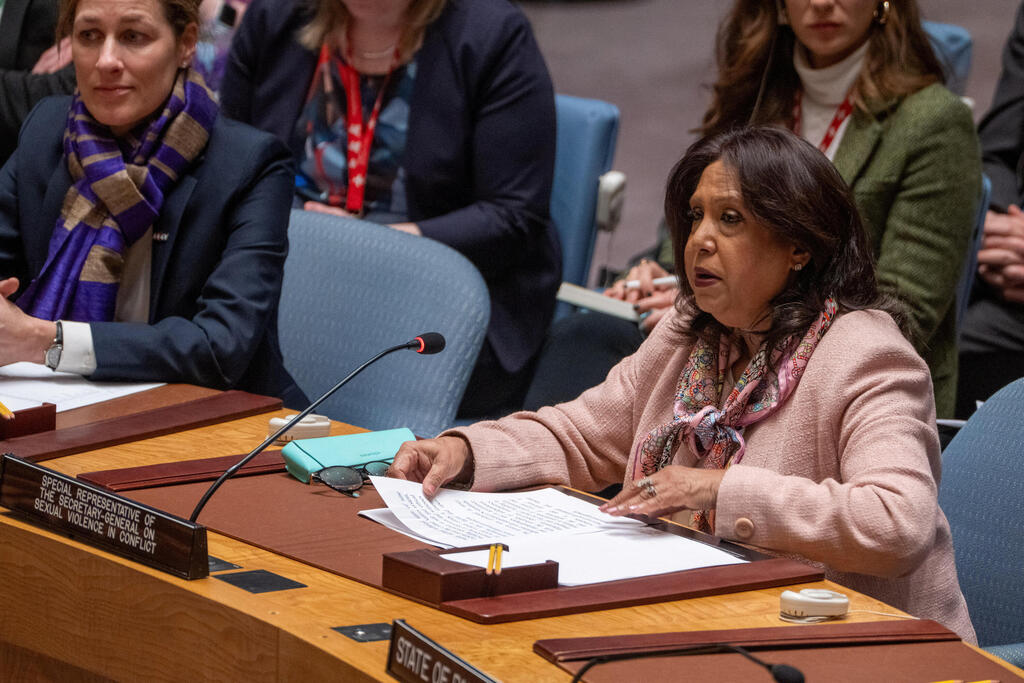Getting your Trinity Audio player ready...
The UN Security Council convened Monday evening for a special session addressing the findings of a recent report on Hamas' sexual crimes against Israelis during the terrorist group’s October 7 invasion.
Israel's sole speaker at the session, Foreign Minister Israel Katz, accompanied by a delegation of over 40 families of hostages held in Gaza, urged the panel's 15-member states to designate Hamas as a terrorist organization and to implement severe sanctions against them.
He stressed the need for the UNSC to exert maximum pressure on Hamas for the immediate and unconditional release of all the hostages it still holds, over five months after its murderous invasion of southern Israel. Highlighting the dire situation, Katz appealed to the council members to end the ongoing "living hell on earth," highlighting their chance to rescue 134 innocent lives.
Katz criticized the UN's silence over Hamas' actions, noting the lack of condemnation for Hamas' brutal crimes in over five months and 41 sessions since October 7.
Prefacing with a "Ramadan Kareem" (happy Ramadan), Katz clarified that Hamas does not represent the Muslim world and called for condemnation of the sexual violence crimes committed by "barbarians" under the guise of Islam.
Lastly, Katz expressed gratitude toward the U.S., France and the UK for initiating the emergency session and thanked Japan, the Security Council's president, for facilitating the meeting.
The Security Council president last week scheduled the discussion following a request from Israel, which was made as an "end run" around UN Secretary-General António Guterres, whom Israeli assessments predicted would not call for a Security Council meeting under his own authority—a prediction that proved accurate.
More stories:
At the opening of the session, the report's author Pramila Patten, the UN's special representative on sexual violence in conflict, detailed her findings on sexual violence potentially continuing against Israeli hostages.
She said that she had visited Israel on January 29 on a mission to gather and verify reports of sexual violence on October 7 and afterward.
She recounted meeting with the families of the hostages and communities in southern Israel "still in trauma, shock and immense pain, mourning their loved ones and trying to recover." She said that as a mother, she "felt their anguish."
Contrary to Israeli claims, Patten affirmed that there was no attempt by UN Secretary-General Antonio Guterres to suppress her report; she received full support for its public release and immediate transmission to the Security Council.
Patten highlighted the plight of the hostages and their families, noting that 156 days have passed since the abduction, with at least 16 women among those taken, while Israel believes 19 women remain hostage.
2 View gallery


United Nations Special Representative on Sexual Violence in Conflict Pramila Patten
(Photo: Reuters /David 'Dee' Delgado)
She condemned the violence perpetrated by Hamas and other terrorist groups on October 7 against Israel and criticized the collective punishment in Gaza that resulted in thousands of Palestinian casualties.
Russian Deputy Ambassador to the UN Maria Zabolotskaya has raised questions about the integrity of the report, criticizing the document for providing "only partial information from the context of a specific mandate and being asked to respond to it.”
Zabolotskaya attempted to undermine Patten's credibility by accusing her of previously disseminating false information about Russian war crimes in Ukraine.
Despite these criticisms, Zabolotskaya found the report's findings on sexual violence and its assessment of the ongoing risk to Israeli hostages alarming, stating that sexual violence against Israelis "has no justification" and that "those guilty must be held accountable." However, she noted the report's failure to verify Israeli media accounts of severe sexual violence at Kibbutz Be’eri and the Nahal Oz military base.
Furthermore, Zabolotskaya condemned Israel for the report's documentation of sexual violence by Israeli security forces against Palestinians, including threats of rape, strip searches and genital beatings, practices described by the UN and human rights organizations as systematic for decades.
First published: 23:18, 03.11.24



